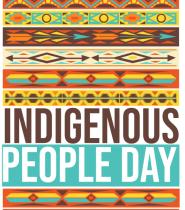Reflection by Sister Laura Nettles
Several weeks ago I was talking with a friend who currently lives in my (our) hometown. We were discussing various community events planned for Indigenous People’s Day when I asked if she was going to attend any of them. She sheepishly responded, “I don’t really like going, it makes me feel uncomfortable because of our history.” She is not alone in her discomfort and I believe that is exactly where we all should be.
There can be no denying the painful and violent legacy of colonization on the Indigenous peoples of our country. But as people of faith, do we truly realize just how much our faith traditions were complicit in this trauma? That Christianity was so intertwined with colonization that it was used as a justification to exploit Indigenous people.
One of the atrocities to come out of colonization were the residential boarding schools for Indigenous children. In 1819, the US Government issued the Indian Civilization Act that led to the creation of hundreds of boarding schools, almost exclusively run by the Catholic Church and/or Protestant communities. These schools generally operated as a means of assimilation of Indigenous children, with punishments meted out for speaking in native languages. The schools assumed white racial superiority and the inferiority of Indigenous cultures. By most accounts, there were 357 of these schools in 30 states, with more than 60,000 children.
The recent discovery in Canada of hundreds of unmarked graves at two of these schools, and the likelihood that thousands more will be found at other residential school sites in the United States, bear witness to the trauma experienced by residents of the schools and the anguish that is continually felt by the Indigenous communities today. The US Department of the Interior, with the full support of the US Catholic Bishops, the United Methodist Church, leaders of the Presbyterian Church and other Christian leaders, has opened up an investigation into these schools in the US. My own community, the FSPA, administered a boarding school in Odanah, Wisconsin (from 1883-1969). No matter how benevolent the intention of the Christian churches and leaders, the devastation is undeniable.
Though many of us may not have been part of the problem, we have an excellent opportunity to be part of the healing. In the words of our FSPA President, Sister Eileen McKenzie: “Our hope is that as we engage our own discomfort by listening to the painful and tragic experiences of Indigenous communities, we can take action in dismantling systemic racism and white supremacy in ourselves and our areas of influence. Our call is to address our complicity in unjust systems, both historically and now, and strive to enhance dignity and wholeness to those who have suffered for generations.”
As we recognize and even celebrate Indigenous People’s Day, my hope is that we let our discomfort move us to a place of engaging our past and its legacy so we can move toward collective healing and discover new pathways of relationships between Indigenous peoples and Christianity.
To learn more about the boarding schools, hear stories from survivors and see the restorative justice being done by religious communities, go to:
FSPA - Truth and Healing (fspa.org).
The National Native American Boarding School Healing Coalition - Education - The National Native American Boarding School Healing Coalition
Reflection:
“I say this to you with regret: many grave sins were committed against the native peoples of American in the name of God . . . How sad this is! How worthwhile it would be for each of us to examine our conscience and learn to say ‘Forgive me!’” Pope Francis
How will we be part of the truth and healing with our Indigenous people? How will we seek forgiveness through action?


